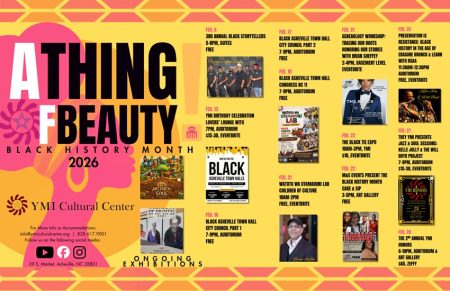Long Before Charlie Pride, ‘Country Music’ Had Esley Riddle
Nashville claims Charlie Pride, but Burnsville has dibs on black music pioneer Lesley Riddle, considered by many to be one of the biggest contributors to country music as we know it today.
By Moe White
Riddle, nicknamed “Esley,” was born in Burnsville in 1905. With little opportunity for schooling, he took a job at a cement plant, where a tragic accident cost him a leg. While recuperating, he learned to play guitar, and for several years he traveled with small string bands to play at churches and social events. In 1928 he met A. P. Carter in Kingsport, Tennessee, and the two men became friends. Carter, his brother and their wives (“Mother” Maybelle was his sister-in-law) would soon become famous as the Carter Family Band.
When the Carters weren’t performing, A. P. and Esley roamed the Appalachians, Carter memorizing song lyrics while Riddle learned the music. Riddle, known for his unique picking and slide technique, also taught “Mother Maybelle” her famed “bottleneck” style.
In 1942 Riddle moved to Rochester, NY and disappeared from public
view. Then in 1963 Mike Seeger (Pete’s brother) and his New Lost City
Ramblers performed with Maybelle Carter, who played some songs Riddle
had taught her. Seeger tracked him down and, between 1965 and 1978,
recorded him on the guitar and piano. In 1993, Rounder Records released
these recordings and others of Riddle playing with the Carter Family.
“Esley” Riddle never received the recognition he deserved, and
the only recording of his music available today is the album “Step by
Step.” But this summer Burnsville’s Parkway Playhouse celebrated the
town’s native son with a world-premiere play about him.
Burnsville first acknowledged Riddle’s historic importance when it
built the Lesley Riddle Recording Studio in 2006 and then held its
first RiddleFest in 2008. Then Parkway producer Andrew Gall, hearing
Riddle’s story, pursued a Blue Ridge Heritage grant and commissioned
Asheville playwright Jeffrey Messer to write “Esley: The Life and
Musical Legacy of Lesley Riddle.”
Messer’s work has been performed throughout the region, and it was
natural for him to write about another local talent. His script is not
a typical theater musical. Instead, Esley’s raw and gritty
craftsmanship is explored in the first act; in Act Two many of the same
songs are performed in their polished, professional versions during a
“Carter Family Radio Concert.”
Though Messer addresses the racial issues raised by Riddle’s and
Carter’s friendship, it’s the music that drives the play. “Very little
[original] material exists on Riddle,” he says. “[T]he main source was
actual audio recordings from the mid 1960s made by Mike Seeger. Riddle
recalled a lot of stories and helped fill in the blanks. Also, he had
never been recorded playing or singing, and Seeger was the first and
only person to capture it.”
Asheville musician Jim Arrendell, who plays Riddle, works as Director
of Music at the Body of Christ congregation on Asheland Avenue, and he
also performs frequently at Tressa’s nightclub. Ironically, he also had
a construction job building the Riddle Recording Studio.
“When I was working on the studio, I’d never heard of Riddle,” he says.
“I had no idea who he was, or about his music.” Nor did it occur to him
that he would soon be playing the man onstage, but it was at that job
that he first met Gall.
“We set up a project together to turn stories – mainly novels – into
recorded plays,” recalls Arrendell. “The first one we did was Freedom’s
Altar, by Charles F. Price.” Arrendell wrote much of the music and
played guitar for the recording. “It was a great production, but not a
good business venture,” he laughs. But the experience did expose Gall
to Arrendell’s talent.
The actor holds Esley Riddle in high honor. “It’s amazing to realize
how musicians, especially black musicians who lived in the mountains in
that time, to realize what an unintended impact they had on the whole
range of music today. It’s a transformative experience to play him.”
“Esley: The Life and Musical Legacy of Lesley Riddle” closed August 8,
2009. Ironically, Mike Seeger died of multiple myeloma on August 7 at
his home in Lexington, Va.
Jeff Messer’s play “This War is Live” premiered in Charleston, SC in
2008. His “Robin Hood, the Legend of Sherwood,” was performed at the
Haywood Arts Regional Theatre in Waynesville in 2000 and the Diana
Wortham Theatre in Asheville.
A native of Aruba, Jim Arrendell attended NC State University. He
performs in public and private events and can be reached at
[email protected].








